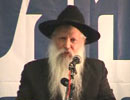- Sections
- Parashat Hashavua
- Torah Portion and Tanach
- Shlach Lecha
492
We see then that in addition to the questions about the Land’s physical characteristics, Rashi understood that they were also to investigate spiritual matters, which confused the spies. How could such different elements coexist? In truth, not only must there be a "kingdom of priests," but also a "holy nation." The nation has foundations of the spirit, so that even when people are involved in agricultural work, it does not remove them from spiritual feelings. As long as a connection is maintained between the two elements, physical activities will not become mundane.
The spies scared the people: "They are stronger than we" (ibid. 31) [in the spiritual realm]. This is a mistake. It is true that when Israel deteriorates, it can be extreme, as the gemara (Sanhedrin 39b) says, "You [Israel] did not do like the most refined [among the nations], but did like the immoral among them." However, if our kingdom of priests has Torah scholars who fulfill their responsibilities, there is a way to emerge from these problems.
Recent events support the spies’ approach. We see estrangement not only from Sinai but from all the foundations of our past. It is not a struggle against a certain religious law, but a struggle to totally break from our entire history and create a new nation that does not want a connection to the traditions of its forebears or to spirituality, but to be assimilated among other nations and worry only about present concerns.
(Ed. note – This was written at a time when the effort to legislate liberal "basic laws" was beginning to take shape.) Talk of democracy is a facade for blurring our uniqueness and allowing doing whatever they desire. If there were a sincere concern for man’s human dignity, then they would treat those with spiritual philosophies better than they are. Rather, these people "cry about family matters," including their distress over children who decide to become religious. They are embarrassed of their lineage. We must ask: What has happened? Were the spies correct?
However, things are different than they appear. The anti-religious sentiment is a backlash to the teshuva movement, which shakes the hearts of those whose children rejected their teachings. This movement shows that the Jewish soul is not satisfied with the world’s vanities and physicality, but seeks elevation. Even if one is distant, he still is drawn to light and internal renewal, and to a holy atmosphere rather than games. This angers and scares the anti-religious.
We can understand this from a place of calm, confidence, and patience. Our patience does not stem from accepting the present situation, but in the confidence that we are in a process that leads to light. We do not need to fight but to be calm with the belief that "Hashem will fight for us" (see Shemot 14:14). What we see are, the last gasps of a movement that seeks to separate us from everything that is sacred, as it sees its wall crumbling.
"These started to cry, whereas Rabbi Akiva was laughing" (see Makkot 24a).

Zealotry (Almost Always) Means Destruction
Rabbi Yossef Carmel | 21 Tamuz 5770

Glory in the Clouds
Rabbi Yossef Carmel | 7 Shvat 5768

Parashat Hashavua: The Song from the Depths of the Soul
Rabbi Yossef Carmel | Nisan 5785

The Torah Connection
Various Rabbis | 5 Adar I 5768

Morning Prayer Times
Rabbi Eliezer Melamed | 5764

Preparing Food on Yom Tov
Rabbi Yirmiyohu Kaganoff

HaRav Abba Berman zt”l, an appreciation
Rabbi Yirmiyohu Kaganoff










